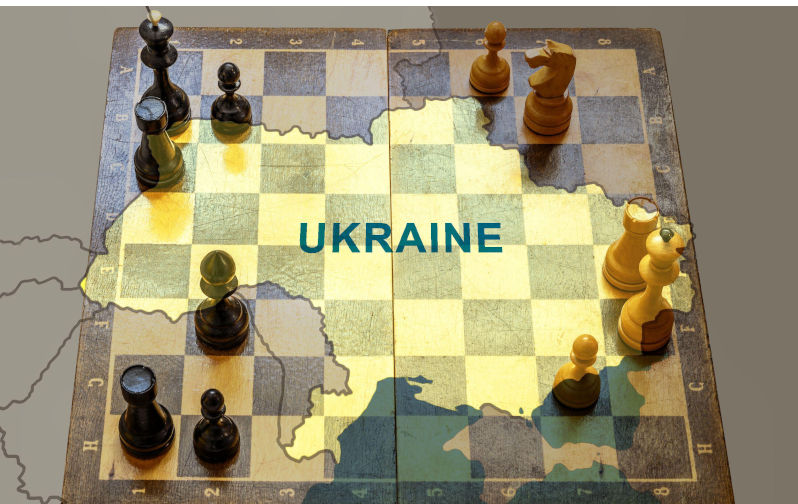Among Donald Trump’s innumerable boasts during his presidential campaign was that the Russia-Ukraine war would be halted the day after he was elected. It didn’t happen then, or even right after his inauguration. But three weeks or so later, a ceasefire and a peace deal are both on the horizon.
The details of whatever comes next will almost certainly be contentious, but no one in their right mind can seriously question the virtue in a cessation of hostilities. Just as no one can doubt that far too much blood, Ukrainian and Russian, has been spilled since Vladimir Putin launched his invasion almost three years ago, with little or no immediate provocation.
There is, of course, a historical case to be made for Russia’s sense of beleaguerment at NATO’s encroachment on its borders, despite verbal assurance that Mikhail Gorbachev was naive enough to take at face value in the final phase of the Soviet Union that the North Atlantic Treaty Alliance would not expand eastwards. It did so relentlessly beginning in the late 1990s, ignoring even the angst of the Western empire’s own man in Moscow, Boris Yeltsin. His surprising successor was initially inclined to play along with the West, but George W. Bush crossed the Rubicon with his vow in 2008 to fast-track the admission of Georgia and Ukraine into the anti-Russia military alliance.
Russian troops marched towards Tbilisi shortly afterwards, and withdrew after securing a favoured outcome in Georgia. Ukraine was targeted six years later, after what Moscow perceived as a Western-flavoured coup. Crimea was occupied, alongside a substantial proportion of the mainly Russian-speaking Donbas region on the border between Ukraine and Russia. This was prompted in part by misguided policies from Kyiv that unwisely privileged Ukrainian language and culture over the Russian variants.
Any outstanding boundary issues ought to have been sorted out before the leaders of the three Slav republics of the USSR — Russia, Belarus and Ukraine — secretly signed a deal in 1991 that consigned the Soviet Union to oblivion. They weren’t, and the former constituents of the multinational republic were relentlessly pushed by their new Western benefactors towards an economically neoliberal path that devastated one economy after another.
Not surprisingly, the Western neoliberals and neoconservatives have been revolted by the very idea of Trump’s direct negotiations with Vladimir Putin. They have, at the same time, never been bothered by the Zelenskyy Government’s reliance on neo-fascist paramilitaries that gloss over their associations with predecessors who collaborated with the Nazis during World War II. Putin is wrong to damn Volodymyr Zelenskyy’s administration as a fascist force – especially given that many of his more belligerent supporters and supplicants would themselves fall into a similar category.
A peace that concedes some of Putin’s territorial ambitions could conceivably be an acceptable idea provided the beleaguered residents of those territories voluntarily acquiesce to it, which would require a UN poll administered without fear or favour, rather than any process launched by either Moscow or Kyiv.
European liberals are in a panic after Trump’s defence secretary declared that everything is on the table. Pete Hegseth’s personal proclivities suggest he shouldn’t be a part of any governance model. None of the European nations is, however, inclined openly to resist American proclivities, despite foreknowledge of what might be coming their way. Even Denmark, an enthusiastic contributor to every US-led Western imperialist misadventure, has struggled to counter Trump’s brazen claims on Greenland.
Hegseth has said that American troop numbers in Europe might be slashed as part of a Ukraine deal. The bigger question, though, is why on earth there should be US troops in Europe nearly 80 years after World War II. Soviet and allied forces were rapidly withdrawn from Eastern Europe once the Warsaw Pact ceased to exist.
Lately, the latest useful idiot to helm NATO, former Netherlands prime minister Mark Rutte, proclaimed that NATO must “shift to a wartime mindset”, and has advised member nations to allocate 5% of their GDPs to defence spending – mainly to counter Moscow. The idea of negotiating with Russia to avert any military threats appears never to have crossed his narrow mind.
Narrow minds are, of course, rampant in Washington these days as, one after the other, Trump’s nominees get sworn in. Several of them hold bizarre views. Intelligence top honcho Tulsi Gabbard has reputedly long been inclined towards swallowing Moscow’s propaganda and the wiles of its Middle Eastern mates – not least the recently displaced Bashar al-Assad, whom neither Russia nor Iran was inclined to rescue during the US/Turkish/Israeli-co-ordinated endgame.
The usual suspects in the liberal Western establishment are naturally appalled by the Trump administration’s predilections vis-a-vis Europe and Ukraine. Many among them have barely raised an eyebrow over the US president’s malicious plan to occupy Gaza after ridding it of Palestinians. They doggedly refuse to acknowledge the parallels between the genocide of European Jews in the 1930s-40s and the subsequent plans to exterminate Palestinians, which began in 1948 are are now approaching the Final Solution at the behest of a nexus that stretches from Israel to the United States, and incorporates much of Europe.
Putin is often described as a throwback who has never quite recovered from the demise of the Soviet Union, because he once described its dissolution as an epochal catastrophe. The scholars who know better have also acknowledged the blame he has heaped on Vladimir Lenin for recognising Ukraine as an entity separate from Russia insisting that the components of the USSR would always have the right to break away. His successors (until Gorbachev) did not take that constitutional pledge seriously.
Josef Stalin enlarged Ukraine during and in the aftermath of World War II, and his successor, Nikita Khrushchev, brought up in the Donbas, shifted Crimea from Russia to Ukraine. The territory’s indigenous inhabitants had been displaced under Stalin, and replaced mainly with Russians. Khrushchev’s gift did not matter much as long as the USSR existed, but the problem that and any other components of Ukraine might have posed post-1991 ought to have been sorted out before the split. Perhaps Yeltsin was too drunk on the power over Russia that lay before him to contemplate the possible consequences.
Abandoning the fate of Ukraine to someone as ignorant and self-obsessed as Trump was never going to be a good idea. But his doddering predecessor could think of nothing beyond shipping more weapons and ammunition to Kyiv – which can only suggest that Joe Biden wished only to keep the war going. You can refuse to engage with the belligerent-in-chief if peace is not a part of your agenda. Of course, Putin, too, would rather have communicated with his compadre, Trump. And playing the somewhat longer game appears to have worked out well for the Russian president.
What might come next is far from clear, but the fact that change is afoot isn’t necessarily cause for despair. It is easy, and perhaps even necessary, to detest Trump for all he stands for on both the domestic and international fronts. But who can sensibly disagree with the idea of the US, Russia and China slashing their defence budgets by half? “We’re all spending a lot of money that we could be spending on other things that are actually, hopefully, much more productive,” Trump told reporters on Thursday. As Paul McCartney sings in Silly Love Songs, “And what’s wrong with that?/ I’d like to know.”

Mahir Ali
Mahir Ali has worked as a journalist in Pakistan, the UAE and Australia across four decades.
